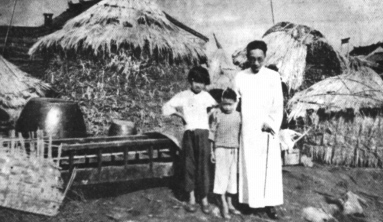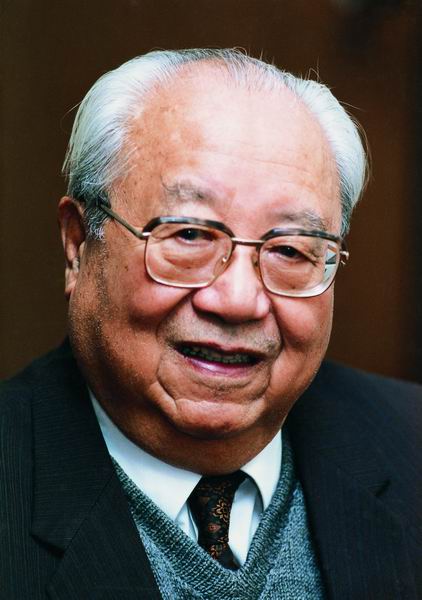Revisiting Fei Xiaotong: Paragon of sociological conceptualization

Fei Xiaotong and local children at Kai Xiangong Village, Jiangsu Province
It was not until the late Qing period that sociology was introduced to the Chinese intelligentsia. As a foreign construct, its theoretical and methodological foundations are firmly grounded in Western experiences. Without critical reflection, a blunt application of Western conceptual tools and theoretical frameworks to Chinese context can only result in fallacious findings and misuse of terminologies.
That is why pioneers of Chinese sociology had to struggle to indigenize the Western-based discipline in addition to translating seminal Western works of the field. Initiated by Yan Fu, Sun Benwen and Wu Wenzao, the indigenization project was carried forward by generations of scholars. Fei Xiaotong played a pivotal role in the process.
In From the Soil: The Foundations of Chinese Society, first published in 1947, he conceptualized the “differential mode of association.” Through constant citation, interpretation, deduction and expansion, the concept became the hallmark of Chinese sociology.
Inheritance and innovation
To a certain extent, the “differential mode of association” is a favorable response to the indigenization project launched by Wu Wenzao, Fei’s mentor. As the pioneer of Chinese sociology, Wu, who was educated in America, realized that Chinese sociology must move toward autonomy and indigenization rather than acting as a supplement to and appendage of its Western forerunner.
In the preface of Series of Sociology, Wu Wenzao expounded upon the implications of the indigenization project: “Scholars of the field should start with assumptions and then verify them with fieldwork and tangible evidence. Theories should be illuminated, confirmed, bolstered and integrated with facts. To secure an autonomous status for Chinese sociology, scholars of the field need to work out a new synthesis of theories and local realities and employ it as the starting point for training the next generation of domestic academics. Their minds, spirits and investigations should be independent of Western influences. This is what is meant by complete indigenization.” In Wu’s opinion, there are two prerequisites for the autonomy of Chinese sociology. First, in addition to translating and reviewing Western works, research in the field should remain relevant to China’s historical experience, developmental challenges and social phenomena. Second, Chinese scholars ought to have an independent spirit, scientific awareness and local concern instead of an uncritical admiration for ideas imported from the West. Wu’s indigenization proposal was an inspiration to Fei Xiaotong, who studied at Yenching University at that time.
From a young age, Fei Xiaotong considered fieldwork to be the single best approach to renewing and acquiring true knowledge. In his opinion, knowledge comes from an understanding of objects and phenomena that are inherently volatile and is therefore subject to constant modification and improvement. Without firsthand experience at a given location, an accurate grasp of its sociological features is virtually impossible.
For these reasons, he conducted filed research in the Dayao Mountain in Guangxi, Kai Xiangong Village in Jiangsu and Lu Village in Yunnan and published Social Organization of Hualan Yao People, Peasant Life in China and Farmland of Lu Village. After doing research in Guangxi and Jiangsu, he came to realize that scholars should have theories and hypotheses in mind before doing fieldwork or it will be difficult, if not impossible, to collect and sort out data in an orderly manner.
Fieldwork grounded in theory became Fei Xiaotong’s favorite approach to Chinese reality. Evidently, Fei’s syncretic method is far superior to either theoretical speculations or depictions of facts. It allowed him to formulate a series of important concepts and ideas.
His From the Soil: The Foundations of Chinese Society has been widely regarded as an exemplar of Chinese sociology. In this seminal book, Fei put forward the concept of the “differential mode of association” and employed it as a conceptual tool to decode Chinese society and culture.
Through Sino-Western comparison, he concluded that Western society, analogous to separate bundles of woods and partitioned by distinct hierarchies and boundaries, is characterized by an “organizational mode of association,” while Chinese social structure, resembling a set of concentric circles with the “self” at the very center, is glued together through a “differential mode of association,” which springs from the Confucian moral system. In Fei’s view, the mode of association is both representative and reflective of society and civilization. It also means that China’s path to modernity is bound to be inherently distinct from the West due to differences between organizational and differential modes of association.
Syncretic approach
There is an inner logic behind Fei’s syncretic approach: To form meaningful concepts, scholars should refer to Western civilization; have a sound understanding of the Chinese experience, culture and history; integrate theories and realities, and engage in cross-culture dialogues. The West, as the “other,” is a perfect frame of reference for measuring the uniqueness of Chinese society.
To acquire an accurate understanding and interpretation of the nation’s uniqueness, scholars need to observe, read, contemplate and reflect upon empirical realities and cultural traditions of China and the West. Take the formation of the “differential mode of association” as an example, Fei Xiaotong not only referred to Confucius and Mencius but also borrowed from great Western minds, such as Tonnies and Durkheim. His experiences in Dayao Mountain, Kai Xiangong Village, Lu Village, Britain and America also contributed to the cause.
Fei Xiaotong has a good grasp of Western knowledge. To him, the academic discursive system, consisting of terminologies and empirical data, is endemic rather than universal. Sometimes, Western terms are not readily applicable to Chinese reality. That is why Fei attached great importance to accordance between terminologies and tangible situations in concept formation.
As he observed, social structure and moral systems are root causes of various prevailing phenomena in China, including exploitation of interpersonal relations, lack of civic virtue, and overemphasis on hierarchy and sequence. Chinese society is glued together through a “differential mode of association” in the sense that hierarchy and sequence, the central themes of Confucian teachings, constitute the underlying structure of its networks, principles, orders and moral system.
Fei’s theory, growing out of modern Western knowledge, traditional Chinese learning and fieldwork, is the quintessence of Chinese sociology. It ushered in a discursive space largely independent of Western sociology.
Beyond Fei’s legacy
The concept of “differential mode of association” stands out above all other sociological theories ever produced by Chinese academia for its enduring popularity and influence. It is indispensible for interpretating social structure and functions, interpersonal relations, and political ecology in China.
Since Fei’s theory became the hallmark of Chinese sociology, the field has undergone staggering quantitative growth in research organizations, budgets, personnel and output.
Though it has grown by leaps and bounds in quantitative terms, Chinese sociology has sunk into a prolonged quality crisis. Enticed into excessive conceptualization, many Chinese scholars have misconstrued academic innovation as concept formation. Flimsy and overbearing, none of their new terminologies can match Fei’s “differential mode of association” in terms of historical insights, explanatory power and intellectual vitality.
At the same time, some scholars lack theoretical awareness, so their research results are either foreign novelties in disguise or laden with exclusivism. Given the all-prevailing enthusiasm about intellectual innovation, we cannot evade the painfully embarrassing question: Why, after Fei’s proposal of the “differential mode of association,” have there been no fundamental breakthroughs in Chinese sociology in terms of knowledge accumulation and theoretical innovation?
Furthermore, how can we surpass Fei’s legacy? How can we generate new knowledge and indigenize sociology on the basis of past achievements? A revisit to Fei Xiaotong may bring solutions to these daunting questions.
Chen Zhanjiang is a lecturer at the College of Law and Political Science at Zhejiang Noramal University.
LINK:

Fei Xiaotong
Fei Xiaotong was born in Wujiang County of Jiangsu Province in China on Nov. 2, 1910 and grew up in a gentry family. He attended Yenching University, where he was encouraged by Robert E. Park, a University of Chicago sociologist. For an his master’s degree in anthropology, Fei went to nearby Tsinghua University, where he studied with Pan Guangdan and learned fieldwork methods from S. M. Shirokogoroff. From 1936 to 1938, Fei studied at the London School of Economics under the pioneer anthropologist Bronislaw Malinowski. Fei wrote his 1938 doctoral thesis, based on earlier fieldwork in Kai Xiangong Village, not far from where he was born and raised, and published it as Peasant Life in China (1939).
Fei Xiaotong’s most important contribution to sociology and anthropology is the concept of “differential mode of association”. He also made significant contributions to the study and management of the development of China’s rural economy.
Other than remarkable academic achievements, Fei was also considered as politically active. Before his death, he held a number of honorary political positions, such as vice-chairman of the Sixth Chinese People’s Political Consultative Conference, vice-chairman of the Seventh and Eighth Standing Committee of the National People’s Congress, and chairman of the Central Committee of the Democratic Union, and so on.
